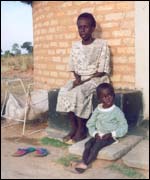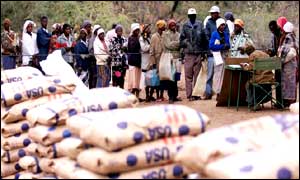|
Zimbabwe |
|
|
Zimbabwe's Health |
|
|
|
Hunger Two million people or more are suffering from starvation from both rural and urban areas of Zimbabwe. The is caused by the worsening food crisis in the country. The current drought situation in Southern Africa isn't helping either. The extreamly high inflation rate and shortage of basic goods, such as mealie meal, bread, and sugar. The World Food Programme (WFP) is doing all it can to help with this problem. Overall Effect Education has been strongly effected by both AIDS/HIV and hunger. Children can not attend school when they are literally starving to death. Even if you aren't suffering that much from starvation, if you are hungry you dont have energy to walk to school, which most children do. When children do attend school, and are hungry they can't concentrate nearly as much as they could with a full stomach. AIDS/HIV had basically wiped out a whole population of adults which leaves the grandparents, or older children watching their siblings. When the older children have to watch the younger children, they are not able to go to school. When children are not educated, it all causes a ripple effect, which doesn't improve the situation at all.
|
|
Deirdre O'Donoghue |
|


